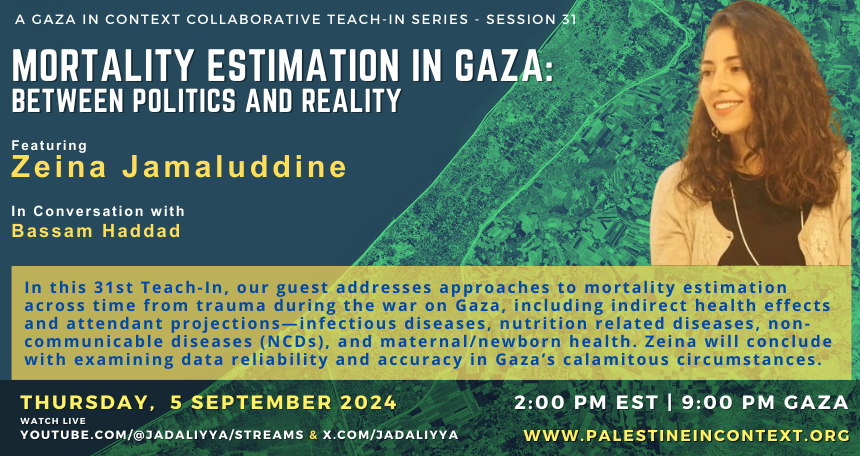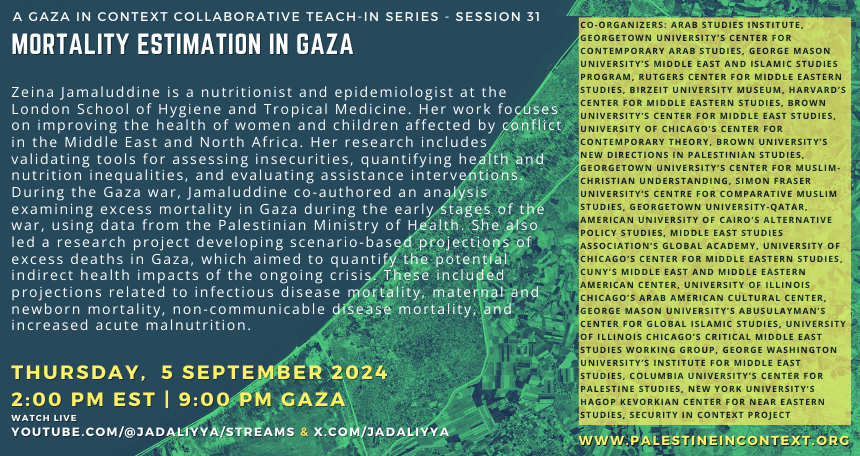Gaza in Context: A Collaborative Teach-In Series — Session 31
Mortality Estimation in Gaza:
Between Politics and Reality
Featuring:
Zeina Jamaluddine
Moderator:
Bassam Haddad
5 September 2024
2:00 PM EST | 9:00 PM Palestine
Teach-In Session 31
In this 31st Teach-In, our guest addresses approaches to mortality estimation across time from trauma during the war on Gaza, including indirect health effects and attendant projections—infectious diseases, nutrition related diseases, non-communicable diseases (NCDs), and maternal/newborn health. Zeina will conclude with examining data reliability and accuracy in Gaza’s calamitous circumstances.
Gaza in Context Collaborative Teach-In Series
We are together experiencing a catastrophic unfolding of history as Gaza awaits a massive invasion of potentially genocidal proportions. This follows an incessant bombardment of a population increasingly bereft of the necessities of living in response to the Hamas attack in Israel on October 7. The context within which this takes place includes a well-coordinated campaign of misinformation and the unearthing of a multitude of essentialist and reductionist discursive tropes that depict Palestinians as the culprits, despite a context of structural subjugation and Apartheid, a matter of consensus in the human rights movement.
The co-organizers below are convening weekly teach-ins and conversations on a host of issues that introduce our common university communities, educators, researchers, and students to the history and present of Gaza, in context.
Co-Organizers: Arab Studies Institute, Georgetown University’s Center for Contemporary Arab Studies, George Mason University’s Middle East and Islamic Studies Program, Rutgers Center for Middle Eastern Studies, Birzeit University Museum, Harvard’s Center for Middle Eastern Studies, Brown University’s Center for Middle East Studies, University of Chicago’s Center for Contemporary Theory, Brown University’s New Directions in Palestinian Studies, Georgetown University’s Center for Muslim-Christian Understanding, Simon Fraser University’s Centre for Comparative Muslim Studies, Georgetown University-Qatar, American University of Cairo’s Alternative Policy Studies, Middle East Studies Association’s Global Academy, University of Chicago’s Center for Middle Eastern Studies, CUNY’s Middle East and Middle Eastern American Center, University of Illinois Chicago’s Arab american cultural Center, George Mason University’s AbuSulayman’s Center for Global Islamic Studies, University of Illinois Chicago’s Critical Middle East Studies Working Group, George Washington University’s Institute for Middle East Studies, Columbia University’s Center for Palestine Studies, New York University’s Hagop Kevorkian Center for Near Eastern Studies


Featuring
Zeina Jamaluddine is a nutritionist and epidemiologist at the London School of Hygiene and Tropical Medicine. Her work focuses on improving the health of women and children affected by conflict in the Middle East and North Africa. Her research includes validating tools for assessing insecurities, quantifying health and nutrition inequalities, and evaluating assistance interventions. During the Gaza war, Jamaluddine co-authored an analysis examining excess mortality in Gaza during the early stages of the war, using data from the Palestinian Ministry of Health. She also led a research project developing scenario-based projections of excess deaths in Gaza, which aimed to quantify the potential indirect health impacts of the ongoing crisis. These included projections related to infectious disease mortality, maternal and newborn mortality, non-communicable disease mortality, and increased acute malnutrition.
Bassam Haddad (Moderator) is Founding Director of the Middle East and Islamic Studies Program and Associate Professor at the Schar School of Policy and Government at George Mason University. He is the author of Business Networks in Syria: The Political Economy of Authoritarian Resilience (Stanford University Press, 2011) and co-editor of A Critical Political Economy of the Middle East (Stanford University Press, 2021). Bassam is Co-Founder/Editor of Jadaliyya Ezine and Executive Director of the Arab Studies Institute. He serves as Founding Editor of the Arab Studies Journal and the Knowledge Production Project. He is co-producer/director of the award-winning documentary film, About Baghdad, and director of the acclaimed series Arabs and Terrorism. Bassam serves on the Board of the Arab Council for the Social Sciences and is Executive Producer of Status Audio Magazine and Director of the Middle East Studies Pedagogy Initiative (MESPI). He received MESA's Jere L. Bacharach Service Award in 2017 for his service to the profession. Currently, Bassam is working on his second Syria book titled Understanding the Syrian Calamity: Regime, Opposition, Outsiders (forthcoming, Stanford University Press).
